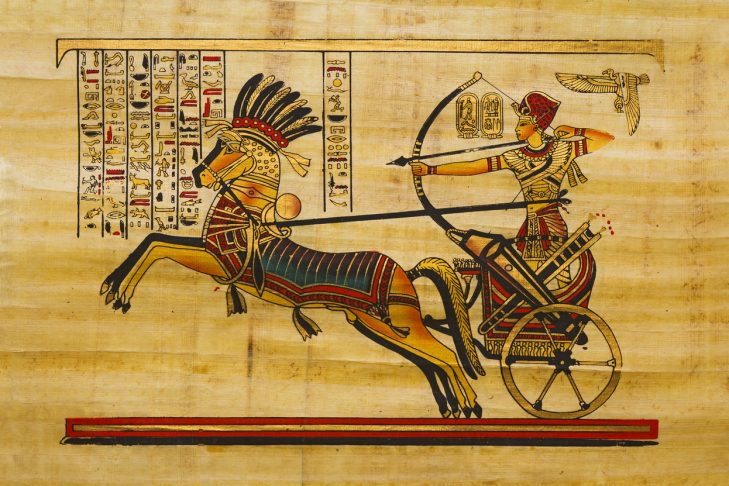“What are you writing about?” my mother asks. And I grumble at her because I’m sure that talking about it will only reveal how thoroughly undeveloped my thinking really is. But then I remember that — even though I am sitting in her house and using her computer — I am, in fact, a grown up and she is, in fact, someone who is often helpful and insightful. And so I tell her that I want to write about this verse that has long fascinated me: “When you go into battle…you shall not be afraid” (Deuteronomy 20:1). Something about it rings a bell with me, but I can’t quite figure out what.
“For one thing,” I continue, “is it a commandment (thou shalt not be afraid) or a promise (you won’t be afraid)? And either way, how is that supposed to work?” My mother nods. “Anyway, this time, when I read the verse I see that I wasn’t remembering the whole thing. It actually starts, ‘When you go out to battle against your enemies and see horse and chariot,’ or in Hebrew ‘sus v’rechev….’
“Is that like ‘Ozi v’zimrat Yah?’” my mother asks. She is referencing part of a verse from the Song of the Sea (Exodus 15:1-18) — the song the Children of Israel sang on their way from slavery to freedom when they had been saved from Pharoah and his forces.
“Funny you should say that,” I answered. I was both delighted and a bit startled. The verse in Deuteronomy says “horse and chariot” while the Song of the Sea opens with the verse, “I will sing to YHVH, Who is exalted, the horse and his rider, He has thrown into the sea.” My mother immediately picked up on the resonance between these two distant verses, and she is not the only one. For centuries, commentators have been reading these verses as connected.
The most obvious point of connection is that the words sound similar in Hebrew; horse and chariot is “sus v’rechev” and horse and his rider is “sus v’rochvo.” Commentators on each of these verses have also been curious about another feature they share: in both verses the words are in the singular. In other words, the Song of the Sea, translated literally, imagines God throwing a single horse and rider into the sea. And Deuteronomy’s commandment (or promise) that we shall not be afraid has us setting out and seeing a single horse and chariot on the battlefield.
Midrash Tanchuma (a commentary that many scholars believe is from the 9th century CE) reads the words “the horse and his rider” (Exodus 15:1) and exclaims “Was there only one horse?!?…Has it not already been stated that he [i.e. Pharoah] took six hundred chariots [as we read in Exodus 14:7]?!?” Rather, the Tanhuma explains, those six hundred chariots were as insignificant to God as if they were a single horse and rider. “As in the verse,” the midrash continues, “‘When you go out to battle against your enemies and see horse and chariot…’ All the horses were considered by Him as one in this instance as well.”
So, the words sound similar and similarly strange: they are singular when we’d expect them to be plural. And this gives rise to the interpretive reading of each verse to mean that in God’s eyes many horses would be as insignificant an obstacle as only one. But when my mother heard our verse from Deuteronomy, telling us “when you go into battle…you shall not be afraid….” she was immediately reminded of a song we sing about a past victory. And this reinforced for me an idea I’d been playing with: the resonance of the verse in Deuteronomy with the line from the Song of the Sea underscores the message of “you shall not be afraid.”
We can actually take the verse and read it this way: “When you go out to do battle against your enemies and you see their horses and their chariots, let ‘sus v’rechev’ be a reminder to you of the Song of the Sea and the horse and rider God threw into the sea. Let this fearsome vision itself start you singing that song of courage as you stand up to this overwhelming force. This song you have carried with you across the generations can now carry you and help you feel that God, the One who brought you out from slavery to freedom, is with you.”
In Parashat Shoftim, where our verse comes from, Moses is continuing his teachings to the Children of Israel in preparation for their entering the Promised Land without him. Neither he nor any of the generation who experienced liberation from slavery firsthand will be with this generation to guide them. Many of Moses’ teaching are rules about how to behave once they get to the Land. But he is also making sure that they remember the story of where they came from and all that their ancestors endured to allow them to make it to this point.
We too find ourselves now in challenging times, times that urge us to stand up for what we know to be right and stand against injustice and bigotry. Many of us feel that we are truly preparing for battle, if we are not already in the middle of it. My blessing for all of us is this: When you set out to take a stand against the forces of oppression (or even just when you read the news) and you see the faces and the symbols and the guns of those you oppose, let those fearsome sights themselves remind you of the songs that have been sung by people of all faiths and traditions as they marched and protested and resisted. These songs are the legacy of those who have gone before us. We have carried them with us so that they can carry us. Sing out and feel the courage growing inside you to do what needs to be done.
Minna Bromberg is a singer, songwriter, rabbi, and voice teacher who lives in Jerusalem with her husband, Rabbi Alan Abrams, and their daughter. Believing that singing both demands and teaches an integration of body, mind, and spirit, Minna teaches voice to rabbis, rabbinical students, and lay people who use their voices in leading prayer. Ordained in 2010 at the Rabbinical School of Hebrew College, she currently runs the school’s Year-in-Israel Program for rabbinical students.
This post has been contributed by a third party. The opinions, facts and any media content are presented solely by the author, and JewishBoston assumes no responsibility for them. Want to add your voice to the conversation? Publish your own post here. MORE


